 The FDA has amended emergency use authorizations (EUAs) for the bivalent COVID-19 vaccine boosters from Moderna (Nasdaq:MRNA) and Pfizer (NYSE:PFE) to allow their use in children at least five years old.
The FDA has amended emergency use authorizations (EUAs) for the bivalent COVID-19 vaccine boosters from Moderna (Nasdaq:MRNA) and Pfizer (NYSE:PFE) to allow their use in children at least five years old.
FDA authorized a single dose of either bivalent vaccine in younger age groups at least two months after completion of primary or booster vaccination.
MRNA shares were up 8.28% to $130.72. PFE shares were mainly flat, holding steady at $42.03. BioNTech, which worked with Pfizer in developing the original and updated mRNA vaccine, saw its stock increase 5.53% to $136.65.
The bivalent vaccines from Moderna and Pfizer-BioNTech include an mRNA component shared between the omicron variant BA.4 and BA.5 lineages.
FDA’s decision to authorize the bivalent Pfizer-BioNTech COVID-19 vaccine booster overrides its prior authorization of the companies’ monovalent booster in children aged five to 11.
The revised Moderna authorization will make its 25 μg bivalent booster available for individuals six to 11 years of age. In addition, a 50 μg bivalent booster will be available for adolescents 12 to 17 years old.
“Vaccination remains the most effective measure to prevent the severe consequences of COVID-19, including hospitalization and death,” said Dr. Peter Marks, FDA’s director of the Center for Biologics Evaluation and Research (CBER). “While it has largely been the case that COVID-19 tends to be less severe in children than adults, as the various waves of COVID-19 have occurred, more children have gotten sick with the disease and have been hospitalized,” Marks continued in a news release.
Children infected with COVID-19 can have complications, including multisystem inflammatory syndrome.
Pfizer noted that it would begin shipping the 10-µg booster doses of the Pfizer-BioNTech vaccine as soon as CDC backs FDA’s recommendations.
A recent peer-reviewed study published in Eurosurveillance found that the updated Pfizer and Moderna boosters provided similar protection to the original boosters.
Moderna’s pediatric EUA application was based on clinical trial booster data for the company’s original vaccine. The application also included preclinical data for the updated mRNA-1273.222 booster plus Phase 2/3 data related to the mRNA-1273.214 omicron-adapted booster.
Filed Under: Infectious Disease





Tell Us What You Think!
You must be logged in to post a comment.